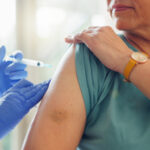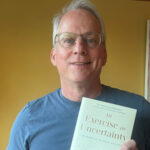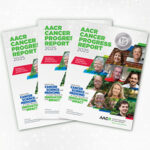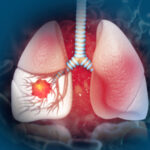-
October 24: The Week in Cancer News
COVID vaccines may improve immunotherapy effects, and a drug combination reduces the risk for death in bladder cancer.
by Darlene Dobkowski
-
October 17: The Week in Cancer News
Prior authorizations pose a significant time burden for patients, and sentinel lymph node biopsy reduces side effects in cervical cancer.
by Marci A. Landsmann
-
October 10: The Week in Cancer News
Older people with multiple myeloma can receive a less toxic drug regimen, and the FDA approves an immunotherapy for people with high-risk skin cancer.
by Thomas Celona
-
October 3: The Week in Cancer News
Widespread uptake of HPV vaccine linked to reduced rates of cancer-causing infection in all, and radiation prevents recurrence in locally advanced bladder cancer.
by Eric Fitzsimmons
-
Lessons From 20 Years Living With Cancer
Multiple myeloma survivor Jonathan Gluck reflects on uncertainty, and the scientific progress that has kept him living with cancer for more than two decades.
by Eric Fitzsimmons
-
September 26: The Week in Cancer News
US trial to look at impact of AI-assisted mammograms, and vitamin B12 may help curb chemotherapy-associated hand-foot syndrome.
by Darlene Dobkowski
-
The Enduring Importance of Cancer Disparities Research
Opening session from AACR conference highlights how perseverance and adversity have informed cancer disparities research over the years.
by Eric Fitzsimmons
-
September 19: The Week in Cancer News
Report highlights progress against cancer amid call for federal government to fund cancer research, and low-dose aspirin fends off recurrence after surgery in colorectal cancer.
by Marci A. Landsmann
-
Most Cancer Survivors Don’t Meet Healthy Diet Goals
Despite research linking fruits and vegetables to cancer survival, many people do not change their eating habits after diagnosis.
by Darlene Dobkowski
-
September 12: The Week in Cancer News
Combination of targeted therapy and chemotherapy prolongs survival in lung cancer, and FDA approves a chemotherapy-releasing device to treat bladder cancer.
by Thomas Celona
Cancer Talk
Lessons From 20 Years Living With Cancer
Multiple myeloma survivor Jonathan Gluck reflects on uncertainty, and the scientific progress that has kept him living with cancer for more than two decades.
by Eric Fitzsimmons
The Enduring Importance of Cancer Disparities ResearchOpening session from AACR conference highlights how perseverance and adversity have informed cancer disparities research over the years.
by Eric Fitzsimmons
Most Cancer Survivors Don’t Meet Healthy Diet GoalsDespite research linking fruits and vegetables to cancer survival, many people do not change their eating habits after diagnosis.
by Darlene Dobkowski
Many People Don’t Get Colonoscopy After Receiving Abnormal Blood TestsAbout half of people who receive abnormal results from colorectal cancer screening tests don’t follow up with a colonoscopy.
by Laura Gesualdi Gilmore














